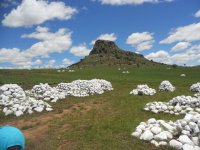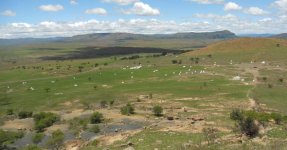Charity Shield 1910
New member
- Jan 4, 2021
- 556
Yesterday and today in 1879 the defence of Rorke's Drift took place. So a few "not allot of people know that" facts, one f which is that Colour Sergeant Bourne is "one of our own":-
1. The conflict was more of a frolic of the British High Commissioner (Frere) rather than a British Government foreign policy, or as we would call it today, an example of 'devolution' working in practice. This was very common throughout the history of the British Empire, which at it's core was more a collection of private ventures than a central British Government creation.
2. The reasons for the war are numerous, including the desire to copy the Canadian model of Federations in South Africa by the then High Commissioner. There was also a desire to help defuse tensions between British settlers who were denied many "rights" such as the right to vote in Boer provinces - this also became one of the reasons for the later Boer War. Solving the Boers/ Zulu problem, it was thought by Frere, create stability in the region.
3 The Boers first arrived in modern day South Africa in or around 1652, then expanded out into the bush during the Great Trek in 1836. The Zulu nation was itself formed out of the Bantu migrations into South Africa, from the other way, from central to southern Africa. In 1818 Shaka Zulu formed a powerful state out of military aggression. Old tensions between Boer and Zulu were heightened by thefts of Boer cattle and encroachment into Zululand by Boer farmers. The Boer/Zulu conflicts had gone back generations. The battle of Blood River 1838 being one of the most notable examples.
4. One of the stated British demands on the Zulu that made war inevitable, was the abolition of slavery in Zululand.
5. The Zulu attack on Rorke's Drift was against orders after the successful attack at Isandlwana.
6. The British Regiment was not Welsh. They were a part of a numbered regiment (24th regiment). Most defenders at the drift were English, then Irish and the third most represented group were Welsh.
7. Colour Sergeant Frank Bourne, immortalised in the film was "one of our own", born and brought up as a farm hand in Balcombe, Sussex. He left the farm and joined the army. He became the youngest NCO in the British Army and had the nickname "The Kid'. After Rorke's Drift he turned down a commission because he couldn't afford it. He went on to serve in India and Ireland (during WW1). He died on 9 May 1945, VE Day.
8. British dead and wounded were all as a result of bullet wounds, not stabbing.
9. The Zulu had a practice of opening up the bellies of dead and dying opponents after a battle so, it is claimed, to release their souls. This occured at Isandlwana.
10. The British army at Isandlwana was not fully deployed before it was overwhelmed. The British thought they would fire a few shots and that would pretty much be the end of it, because that had been the experience in recent southern african wars. Survivors (there were a few) described how they thought they were winning the battle until it was too late. Lord Chelmsford had also split his forces and went off looking for the enemy, when in fact, the enemy had found them. One of those 'bugger, got that one wrong" moments.
11. Some argue that after Rorke's Drift, the British defenders walked around the site killing by bayonet wounded Zulu warriors. Bourne in his account says they buried 351 dead Zulus (to British 17 killed/9 wounded), and 400 to 500 Zulu wounded. Bourne's account says that they were removed by the Zulu under cover of night.
12. Hook was not a criminal, he was not a cockney, and was not a malingerer. He was from Gloucestershire, settling in London after leaving the army. He died of TB in 1905 after working at the British Museum. His relatives were unhappy with his portrayal in the 1960s film.
13. Chard left the army in 1897, he died the same year of cancer. He had lunch with Queen Victoria after the battle but shunned most publicity.
14. Bromhead was from a military family, his great grandfather fought at Quebec, grandfather in the American War of Independence, and his father at Waterloo. He missed lunch with Queen Victoria because he didn't receive the invitation - he was fishing at the time in Ireland. He died of typhoid serving in India in 1891.
12. The BBC had first hand recordings of accounts of the battle from interviews with Bourne and others. The BBC chose to destroy them. The transcripts can be read today. They make an interesting read.
1. The conflict was more of a frolic of the British High Commissioner (Frere) rather than a British Government foreign policy, or as we would call it today, an example of 'devolution' working in practice. This was very common throughout the history of the British Empire, which at it's core was more a collection of private ventures than a central British Government creation.
2. The reasons for the war are numerous, including the desire to copy the Canadian model of Federations in South Africa by the then High Commissioner. There was also a desire to help defuse tensions between British settlers who were denied many "rights" such as the right to vote in Boer provinces - this also became one of the reasons for the later Boer War. Solving the Boers/ Zulu problem, it was thought by Frere, create stability in the region.
3 The Boers first arrived in modern day South Africa in or around 1652, then expanded out into the bush during the Great Trek in 1836. The Zulu nation was itself formed out of the Bantu migrations into South Africa, from the other way, from central to southern Africa. In 1818 Shaka Zulu formed a powerful state out of military aggression. Old tensions between Boer and Zulu were heightened by thefts of Boer cattle and encroachment into Zululand by Boer farmers. The Boer/Zulu conflicts had gone back generations. The battle of Blood River 1838 being one of the most notable examples.
4. One of the stated British demands on the Zulu that made war inevitable, was the abolition of slavery in Zululand.
5. The Zulu attack on Rorke's Drift was against orders after the successful attack at Isandlwana.
6. The British Regiment was not Welsh. They were a part of a numbered regiment (24th regiment). Most defenders at the drift were English, then Irish and the third most represented group were Welsh.
7. Colour Sergeant Frank Bourne, immortalised in the film was "one of our own", born and brought up as a farm hand in Balcombe, Sussex. He left the farm and joined the army. He became the youngest NCO in the British Army and had the nickname "The Kid'. After Rorke's Drift he turned down a commission because he couldn't afford it. He went on to serve in India and Ireland (during WW1). He died on 9 May 1945, VE Day.
8. British dead and wounded were all as a result of bullet wounds, not stabbing.
9. The Zulu had a practice of opening up the bellies of dead and dying opponents after a battle so, it is claimed, to release their souls. This occured at Isandlwana.
10. The British army at Isandlwana was not fully deployed before it was overwhelmed. The British thought they would fire a few shots and that would pretty much be the end of it, because that had been the experience in recent southern african wars. Survivors (there were a few) described how they thought they were winning the battle until it was too late. Lord Chelmsford had also split his forces and went off looking for the enemy, when in fact, the enemy had found them. One of those 'bugger, got that one wrong" moments.
11. Some argue that after Rorke's Drift, the British defenders walked around the site killing by bayonet wounded Zulu warriors. Bourne in his account says they buried 351 dead Zulus (to British 17 killed/9 wounded), and 400 to 500 Zulu wounded. Bourne's account says that they were removed by the Zulu under cover of night.
12. Hook was not a criminal, he was not a cockney, and was not a malingerer. He was from Gloucestershire, settling in London after leaving the army. He died of TB in 1905 after working at the British Museum. His relatives were unhappy with his portrayal in the 1960s film.
13. Chard left the army in 1897, he died the same year of cancer. He had lunch with Queen Victoria after the battle but shunned most publicity.
14. Bromhead was from a military family, his great grandfather fought at Quebec, grandfather in the American War of Independence, and his father at Waterloo. He missed lunch with Queen Victoria because he didn't receive the invitation - he was fishing at the time in Ireland. He died of typhoid serving in India in 1891.
12. The BBC had first hand recordings of accounts of the battle from interviews with Bourne and others. The BBC chose to destroy them. The transcripts can be read today. They make an interesting read.
Last edited:




